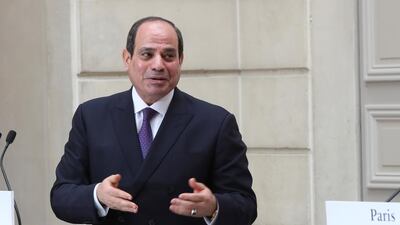Egypt's President Abdel Fattah El Sisi on Monday paid tribute to the “sincere” youths who led 2011 revolution, which forced long-time ruler Hosni Mubarak to step down.
Mr El Sisi devoted much of his televised anniversary comments to commending the police for their heroism.
The anniversary of the uprising falls on the same day Egypt celebrates Police Day.
The young activists behind the 18-day revolution deliberately selected the date to highlight perceived police brutality under Mubarak’s 29-year rule.
A former general, Mr El Sisi was first elected president in 2014, a year after he led the military’s removal of Mohammed Morsi, an Islamist president from the Muslim Brotherhood whose one year in office proved divisive.
He has since made security and the economy his top priorities as his government cracked down on Brotherhood followers. The Brotherhood was outlawed in 2013 and declared a terrorist organisation.
“Today coincides with the anniversary of the January 25 revolution. A revolution that was led by sincere youths who aspired to a better reality and a better future,” Mr El Sisi told a celebration held at the national police academy in a suburb east of Cairo.
“I want to tell Egypt’s youths that your country is looking to your strong arms and sincere endeavours to complete the march of reform, construction and development.”
Earlier in his comments, Mr El Sisi lavishly praised the heroism of the police in their fight against extremists and for bolstering security.
“Amid all the conflicts, the schemes and conspiracies, the stability of Egypt stood out as an embodiment of the strong will of the state and its glorious people,” he said.
“It was the fruition of the sacrifices made by its loyal children in the police alongside their brave brothers in the armed forces,” said the president. He heard from the widows of police officers who fell in the line of duty and decorated senior police officers.
As has been the case for most of the past decade, there was little sign of public celebration to mark the revolution’s anniversary. But security was beefed up in and around Cairo’s Tahrir Square, the birthplace of the revolution in the heart of the Egyptian capital.
Scores of armed black-clad riot police backed with armoured vehicles were stationed along downtown Cairo streets leading to the square, which has been renovated almost beyond recognition over the last year.
"Historians will one day do the research and write the story of the revolution," Ibrahim Awad, a public policy professor at the American University in Cairo, wrote this week in the independent Al Shorouk newspaper.


